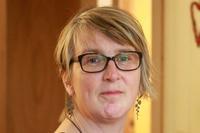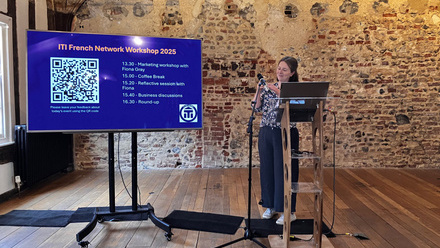The power of revision clubs
Kerry Gilchrist describes why she became involved in a revision club with two fellow translators and how it now forms part of her ongoing CPD.
The traditional image of a translator is someone sitting in a room on their own, surrounded by books, tapping away on a keyboard. It often is a solitary profession, but it is also full of opportunities to interact and socialise with others – conferences, network meetings, virtual groups, and so on. And CPD, of course.
The theme of the Sheffield conference back in 2019 was 'Beyond the core: forging the future of the profession' and it examined the way in which, individually and collectively, we can rise to future challenges. Prophetic words, with the benefit of hindsight!
One of the sessions at that conference was by Simon Berrill & Victoria Patience and they talked about the revision club that they had set up with a third translator as a collaborative way of improving their translation skills. That planted a seed at the back of my mind.
Later that year, I signed up for the ITI's Advancing your Freelance Translation Career course. As well as excellent webinars by experienced tutors, I was delighted with the supportive and stimulating relationship that developed with other participants, with a range of languages and interests between us. One participant and I, with a source language in common, discussed setting up a revision club, I suggested another translator, and the seed from the conference flourished.
Each month, we take it in turns to choose a source text of around 300 to 400 words, ideally an interesting topic that isn't overly straightforward, so we have plenty to get our teeth into. If we come across an interesting text that is longer, then we either just translate part of it, or we continue it across several monthly meetings.
We all prepare a translation and make notes on the issues we encounter and how we addressed them, then we spend a couple of hours comparing our versions, discussing the thinking behind our choices and how we've approached the challenges in the text. We started meeting in June last year and so far, we've translated extracts from a contemporary novel (we all want to know how the story progresses), travel articles, song lyrics and an article about coffee – we try and vary the content and we also like to step outside our comfort zones now and again.
On average, personally I spend an hour or so a month on translating the text, and maybe another half an hour on revising and editing it, although that depends on my other work commitments. Our meetings to discuss the texts then last between one and two hours, although there has been one occasion where we had to schedule a follow-up meeting, as there was so much to discuss! And our May meeting was extra special because - thanks to the relaxation in coronavirus measures - we actually met in York and discussed the text in person over coffee and cake.
The aim of revision club is to provide a safe and non-judgemental environment where we can learn from our mistakes or lack of knowledge. It's also an opportunity to learn from each other, as every translator will take a different approach to their translation and it's fascinating and illuminating to see the process through someone else's eyes. One of the translators in our club also does a lot of proofreading and editing work, so she brings yet another perspective to the process.
Revision club has undoubtedly developed my translation and writing skills, but that's definitely not all. It's also a valuable and enjoyable opportunity to get together with colleagues who have very definitely become friends. We share business goals, hold each other accountable for commitments we've made, and discuss professional issues, considerations and challenges. And all through CPD.
About the writer

Kerry Gilchrist MITI worked in retail management, national and international customer services and international transport before starting out as a freelance translator in 2000.
Kerry translates from German and Dutch into English, covering arts, humanities, marketing, tourism and business, and has a particular interest in digital transformation, sustainability and the circular economy. She is also joint coordinator for the YTI, ITI's regional Yorkshire Network.






